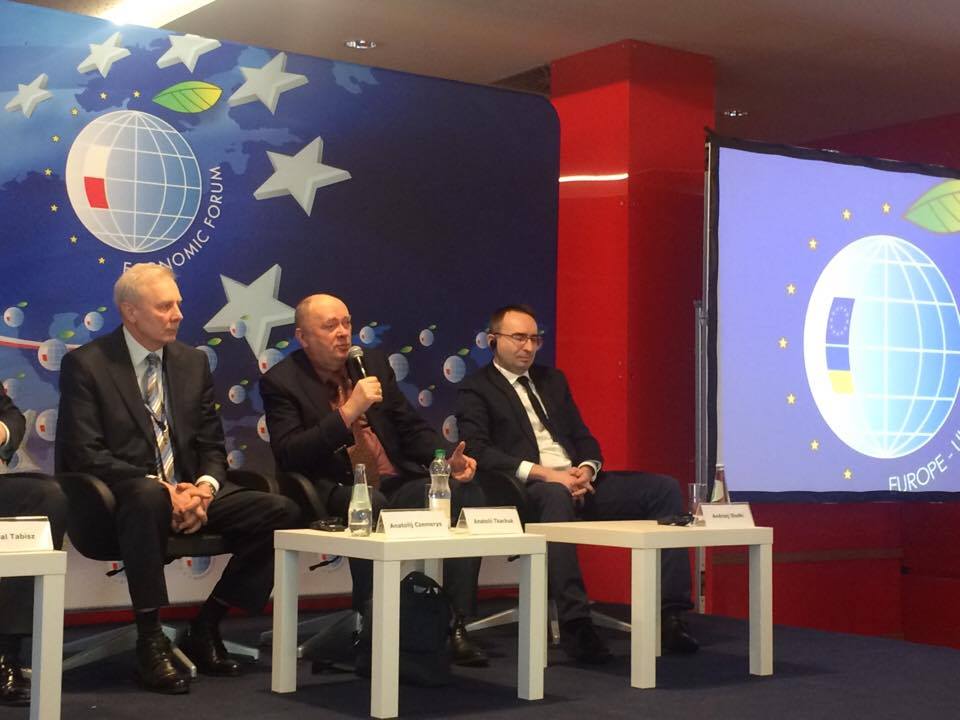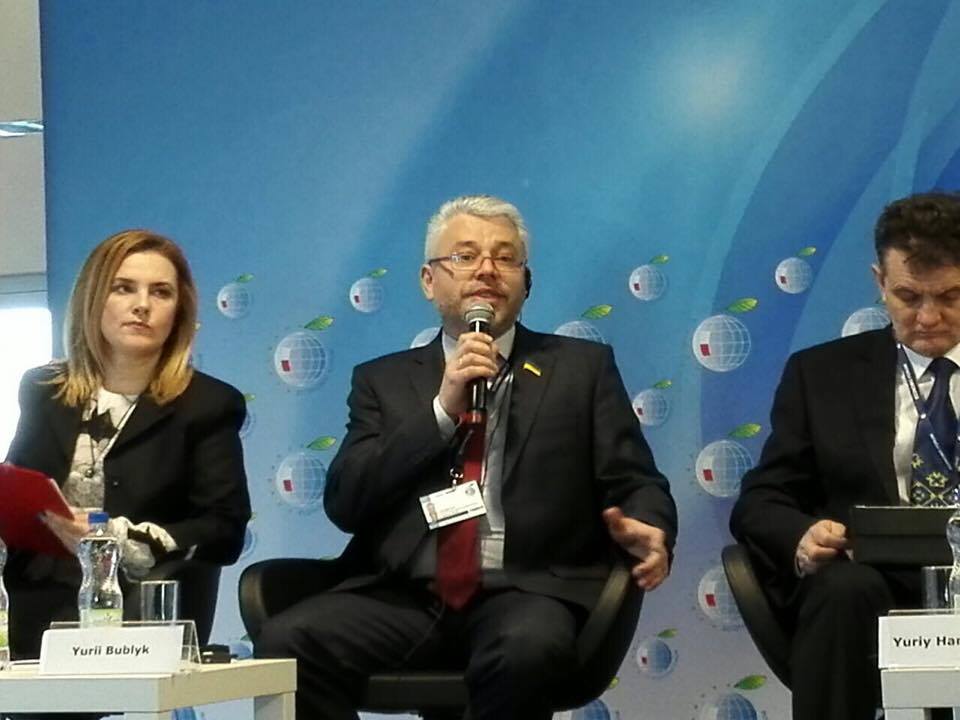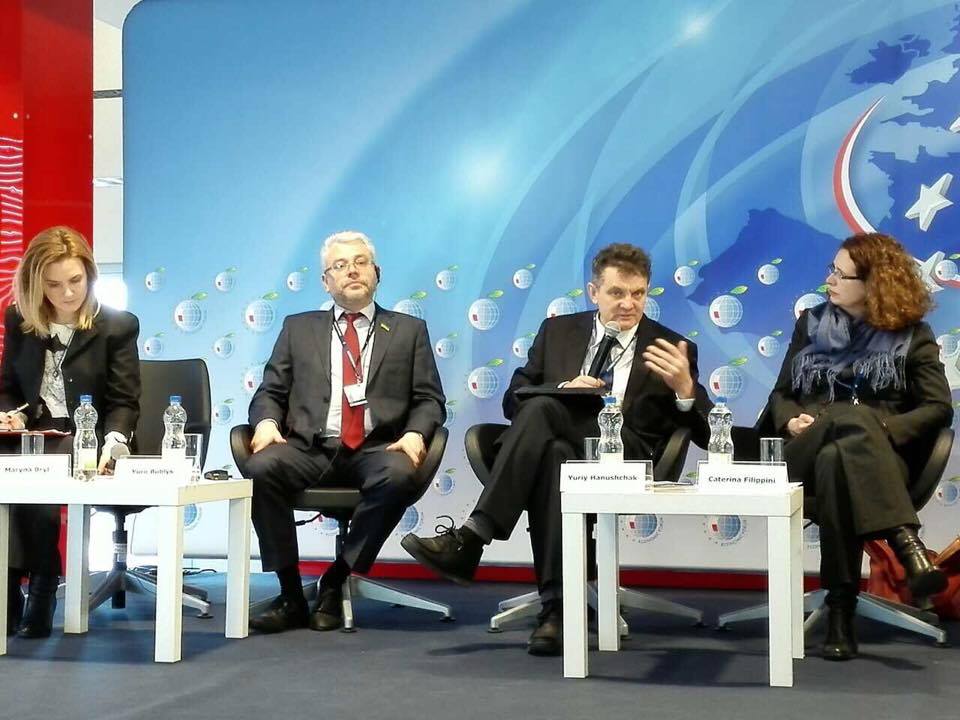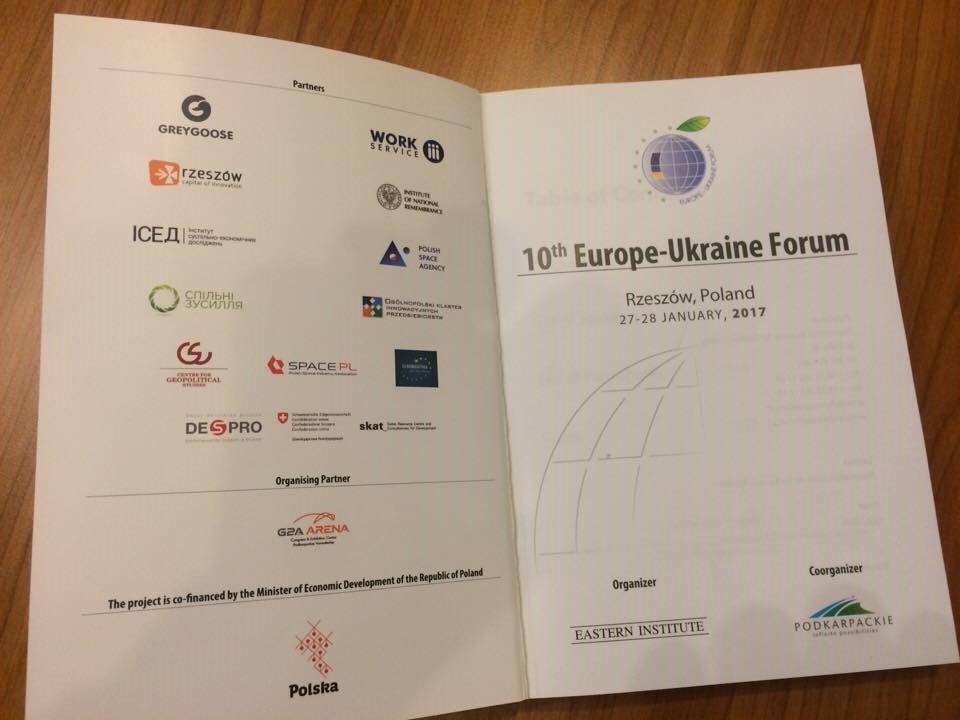DESPRO representatives participated in the X Europe – Ukraine Forum, Rzeszow, Poland 27-28 January, 2017
The Forum is one of the key events regularly organized by the Institute for Eastern Studies. This time, the Swiss-Ukrainian project DESPRO was a partner of the event, the purpose and the main theme of which was the modernization and the development of Ukraine's potential along with the direction and pace of the reforms in Ukraine. It is naturally that decentralization in Ukraine was one of the most important topics of the discussion at the X Europe-Ukraine Forum.
The first panel discussion, which was moderated by Oksana Harnets, Manager of DESPRO Project in Ukraine, was dedicated to increasing the competitiveness of cities and regions and stepping up investment activity.
It is obvious that the growth of competitiveness is an important aim of economic policy. This is about not just business, but cities and regions as well. Successful presentation of a city as the one comfortable for living, enjoyable for visiting and promising in terms of financial investment is of a great importance to enhance the attractiveness and promote the brand of the city.
The participants of the discussion panel, including representatives of the expert community and local government bodies of Ukraine, representatives of the Polish business and the Polish Centre for European projects, discussed the ways of effective promotion of a city or region and determined who should be involved in this process.
One of the authors of Ukrainian reforms, Director of the Civil Society Institute, Anatolii Tkachuk, introduced the dynamics of economic situation in Ukraine and highlighted the changes induced by the reform, expanding the ability of local governments to influence the development of their territories and to form their investment attractiveness. As an example, the speaker cited Satanivska amalgamated territorial community of Khmelnytskyi region which has already defined its strategic priorities and actively attracts investors to its development.

Mayor of Novoukrainka, Oleksandr Korinnyi, pointed out the great practical importance of strategic planning for the development of territories, which allows not only to determine the local development priorities, but to create a favorable environment for investment in the town.
Executive Director of the Association of Small Cities of Ukraine, Valentyna Poltavets, focused on the need and possibilities of training of the representatives of local government bodies and, especially, newly formed amalgamated territorial communities.
The Chairman of the NGO "Institute of Governance," Anatolii Chemerys, focused on the specific conditions of increasing the investment attractiveness of small cities of Ukraine, provided successful examples of small cities (in Lviv, Chernihiv, Odesa, Dnipropetrovsk oblasts) which successfully formed their investment proposals and attracted investors to address their strategic development challenges.
President of "Rzeszów-Jasionka Airport Ltd", Michał Tabisz, presented his rather optimistic position as a representative of the Polish business on the opportunities and potential of cooperation with Ukraine in various fields and expressed the hope that the changes that are taking place in Ukraine will facilitate and speed up such cooperation.
At the end of the debate, Andrzej Słodki, a representative of the Polish Centre for European Projects, outlined the opportunities provided by this Center in Poland, as well as dwelled on the potential possibilities of cooperation with the Ukrainian authorities.
The participants of the discussion panel moderated by a DESPRO expert, Maryna Bryl, discussed the model of local government that would be acceptable for our country under the difficult geopolitical conditions.
The speakers noted that the military actions in the East of Ukraine and the annexation of the Crimea do not leave doubts about Ukraine's development as a unitary state. At the same time, the efficiency of governance will provide the fundamental European principle of a self-government – subsidiarity, as well as a reasonable and balanced approach to the allocation of resources, powers and responsibilities between local regional and central levels.
A People's Deputy of Ukraine, Yurii Bublyk, stressed the importance of equality of all regions and the absence of a special status for certain territories.

Director of the Institute of the Regions of Europe (IRE), Franz Schausberger from Austria, expressed the view that "Separatism is a result of centralization! Decentralization and strengthening of the regions is counteracting separatism!"
In his speech, a Polish expert, Marcin Svencicki, emphasized a number of problems that need to be solved in the course of reform, namely: the lack of a final territorial division; a clear division of competences; a sustainable base of communities revenue so that they could plan their budgets in advance. Mr. Svencicki also expressed an opinion that excessive politization, as well as insufficient coordination of the process, is delaying the reform.
One of the "architects" of the Ukrainian reform, Yurii Hanuschak, told about the main principles on the basis of which decentralization in Ukraine has a great chance of success. He is convinced that these principles are a strong theoretical foundation, a gradual and voluntary approach and control. He explained his thesis by the fact that the reform is based on the European Charter of Local Self-Government; the reform has been carefully and thoroughly prepared for 10 years; therefore, if it is consistently implemented, the system will be sustained.

Hanuschak is convinced that the principle of voluntariness must be the cornerstone of changes and results sustainability factor; therefore, unless everybody is ready to accept the reforms, central decisions on its completion cannot be taken.
As for the control functions, the expert expressed his wishes that the Ukrainian prefect was not as tough as the governor in Poland and not as crafty as the prefect in France. In our reform, there should be a symbiosis of the French and Polish systems with some of the German experience.
However, life is making adjustments to the work of the "architects of the reform." The reform should be based on the local elite. Unless there is a request from below, the MPs will not wish to support the reform because politicians are seeking to have political dividends.
Head of the Ternopil Oblast State administration, Stepan Barna, refuted the popular myth that all local state administrations are against the reform. As an example, he cited his region - the leader by the pace of forming amalgamated territorial communities.
In general, the discussions showed that the reforms in Ukraine led to a change in the paradigm of the activities of local governments and guided them to intensive development, forming the brand of the territories and to active search of investors. It is early to speak about the large scale of this process yet, but significant positive developments have occurred. On the other hand, one can say about a certain interest of the Polish and European structures to investing projects in Ukraine.



